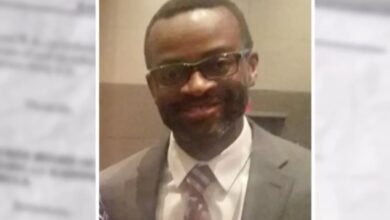
Air Force Barred from Discharging HIV-Positive Service Members
The injunction was upheld on January 10.

A three-judge panel of the Fourth Circuit U.S. Court of Appeals on January 10 unanimously upheld a national injunction to stop the U.S. Air Force from discharging service members who are HIV positive.
The ruling immediately helps at least six service members with HIV who have faced a discharge because of it, stopping the military from releasing them from their obligation to serve until a trial can be held on their lawsuits challenging the policy.
Unless the Trump administration appeals the January 10 ruling to the U.S. Supreme Court, the case now goes back to U.S. District Court in Alexandria, Virginia, for consideration of policy.
Current military policy bans people with HIV from enlisting, but allows those already in the military to stay as long as they are fit for duty and deployable to assignments in foreign military arenas.
However, the Air Force has interpreted the policy to be a de facto ban on any HIV service member by claiming, among other things, that such service members pose a risk to others, noting that some foreign nations ban people with HIV.
The Fourth Circuit panel, which included two Democratic and one Republican appointee, said the policy was based on “outmoded” information about HIV transmission and that the military cannot justify banning a person with HIV from all military arenas just because some countries have an HIV ban.
A discharge for HIV, said the panel, “must be based on objective evidence in the record and must consider the individual servicemember’s physical abilities, fitness, and deployability.”
The decision was written by Judge James Wynn (a Clinton appointee) and joined by Judges Albert Diaz (an Obama appointee) and Henry Floyd (an appointee of George W. Bush).
In the opinion, Judge Wynn took time to explain some of the history of HIV infection, including the “stigma, fear, and misinformation” about the disease that persists today. He noted that the “pre-exposure risk of transmitting untreated HIV during the riskiest sexual activity” is only 1.38 percent, according to the U.S. Centers for Disease Control and Prevention. Infection through “biting, spitting, and throwing bodily fluids,” notes the opinion is “technically possible” but “negligible.”
Treatment for most people infected with HIV, wrote Wynn, requires taking one pill a day that dramatically reduces the amount of virus in the body, produces “minimal side effects,” and requires no special handling or dietary limitations. Medical monitoring can be done by a general practitioner. And once viral suppression is achieved, people on the regimen “have effectively no risk of sexually transmitting the virus,” except through blood transfusions. People with HIV are barred from donating blood.
Those who are timely diagnosed and treated “experience few, if any, noticeable effects on their physical health and enjoy a life expectancy approaching that of those who do not have HIV,” noted Wynn.
“A ban on deployment may have been justified at a time when HIV treatment was less effective at managing the virus and reducing transmission risks,” Wynn added. “But any understanding of HIV that could justify this ban is outmoded and at odds with current science. Such obsolete understandings cannot justify a ban, even under a deferential standard of review and even according appropriate deference to the military’s professional judgment.”
The lawsuit was filed in December 2018 by Lambda Legal and the Modern Military Association of America (MMAA), formerly known as OutServe-SLDN.
A district court in Alexandria, Virginia, ruled the discharges violated the HIV-positive military members’ rights to equal protection under the U.S. Constitution and violated the federal Administrative Procedure Act. It granted a national injunction barring the Air Force from discharging them.
According to court documents, Richard Roe, is a staff sergeant who enlisted in 2012 and has earned “numerous awards.” He was diagnosed with HIV infection in 2017, immediately began treatment, and has achieved an undetectable viral load. Despite the support of his commanding officer and primary care doctor, two Air Force panels recommended he be discharged.
The plaintiff identified as Victor Voe enlisted in 2011, was deployed twice, and diagnosed with HIV in 2017. He, too, began treatment and succeeded in reducing his viral load to undetectable levels. The Air Force panels recommended his discharge, too.
The January 10 opinion noted that MMAA identified at least four other members of the Air Force discharged for HIV status alone. Lambda and MMAA have filed two other lawsuits on behalf of other service members with HIV.
The panel affirmed the injunction and said the servicemembers are “likely to succeed” in their lawsuit.











Comments